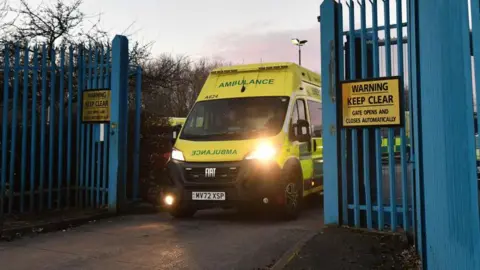ARTICLE AD BOX

 Getty Images
Getty Images
Ambulance crews are wasting “significant” amounts of time being called out unnecessarily to prisons across England, the health safety watchdog has said.
One NHS trust told investigators it dealt with 5,000 calls to 999 from prison staff across its region in 2023.
Overall the research found that almost three in four calls from prisons did not need an ambulance response, compared with one in eight calls from the general population.
The Department of Health said it was “essential” that an ambulance was called only when there was a serious concern about the health of the prisoner.
On one occasion, several crews, including an air ambulance, were dispatched to an “unresponsive” inmate who was thought to be unconscious, the watchdog said.
On arrival they found the patient was simply refusing to answer questions.
One anonymous paramedic told investigators that “we waste vital time driving to a prison for a call which then gets cancelled, and we’ve just added that time on to the response to someone who [really] needs us”.
Afraid of being blamed
The report by the Health Services Safety Investigations Body (HSSIB) found that prisons often encouraged a “low-risk response” when inmates were injured or fell ill.
Some prison control rooms were told to call 999 immediately and then wait for an on-site nurse to examine the patient, and then stand down the ambulance if it was not needed.
High turnover and a lack of training meant that prison staff first on the scene of a medical emergency tended to be inexperienced.
Some staff told the watchdog they were afraid of having to attend a coroner’s court or being blamed for making a wrong decision if they did not call 999.
“You end up with a system that doesn't work for anybody,” said the HSSIB’s senior investigator Dave Fassam.
"It's putting pressure on prison staff who are very busy... and paramedics who don't want to be called to a scenario that doesn't warrant them being there."
The watchdog was told that the volume of emergency calls from prisons was now having a knock-on effect on the wider community, with paramedics and call handlers left frustrated after ambulances were diverted from other jobs unnecessarily.
It said communication between prison staff and the emergency services needed to improve significantly, with crews sometimes dispatched to a prison with the wrong information.
In one case, paramedics had been told they were going to treat a patient in his 90s with a twisted ankle. When they arrived they found a man in his 30s with several stab wounds.
Important concerns
The Department of Health said that the prison service, NHS England and ambulance services were already working to improve communication and address concerns raised by the safety watchdog.
New training is also being rolled out to help prison staff respond to medical emergencies.
The Association of Ambulance Chief Executives, which represents the 10 major NHS ambulance trusts in England, said it hoped the report would improve the way prisons and ambulance services work together "to ensure the same standard of health care services for people in prisons and in the community".

 9 months ago
43
9 months ago
43








 English (US) ·
English (US) ·